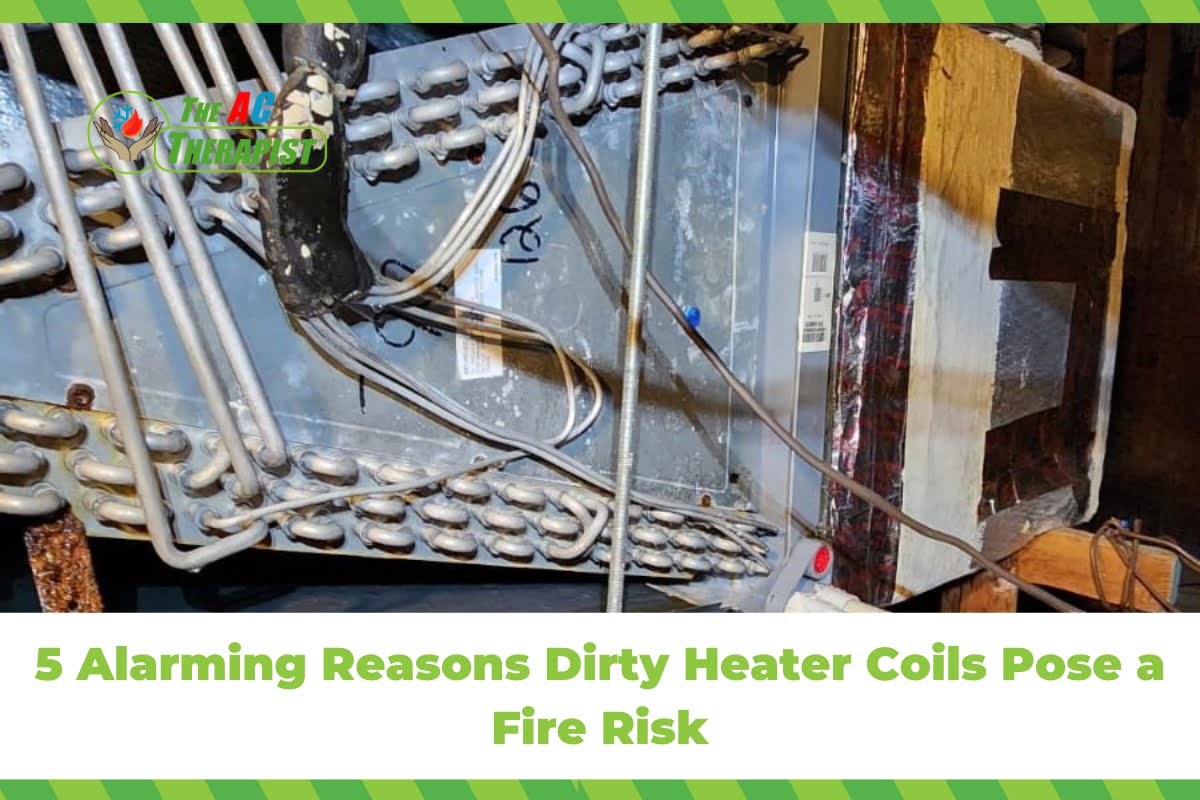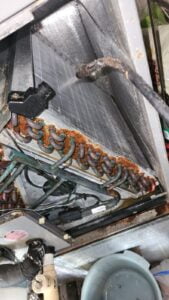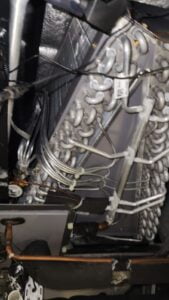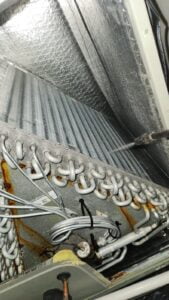5 Alarming Reasons Dirty Heater Coils Pose a Fire Risk
As The AC Therapist, I’ve seen the consequences of neglected HVAC systems firsthand. Central to a well-functioning system is the heater coil, a component that can easily be taken for granted, until it becomes a source of danger. I want to share with you five alarming reasons why allowing dirt to accumulate on your heater coils is more than a maintenance oversight; it’s a serious fire risk.
Understanding the vitality of a well-maintained heating system, we at The AC Therapist want to empower you with knowledge on cleaning your heater coils, ensuring your home remains the sanctuary of comfort and warmth it should be.
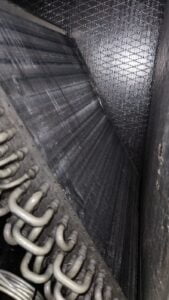
When to Clean Your Heater Coils?
We recommend a yearly inspection and cleaning, typically in the fall, before the onset of the cooler months when you’ll rely on your heating system the most. However, if you notice any signs of decreased performance, it might be time for a check-up.
The Cleaning Process:
- Safety First: Always turn off the power to your HVAC system to prevent any electrical hazards. This is non-negotiable for the safety and protection of your system.
- Access the Coils: Remove the access panel with the appropriate tools — this is typically a simple task, but one that must be done with care to avoid any damage.
- Initial Inspection: Once you have a clear view, inspect the coils for any noticeable build-up or damage. This will inform the intensity of the cleaning needed.
- Vacuuming: A soft brush attachment on your vacuum cleaner can be your best friend here. It’s gentle yet effective at removing loose debris without harming the delicate coils.
- Apply Cleaner: Utilize a commercial coil cleaner suitable for your system. These specialized solutions are formulated to break down the dirt without corroding the coils.
- Rinse (If Required): Depending on the cleaner used, you may need to rinse the coils. If you’re cleaning evaporator coils located indoors, you’ll want to use a no-rinse foam that dissolves and drains away.
- Straighten Fins: If during your inspection you notice any bent fins, carefully straighten them with a fin comb. This ensures that air can flow freely, optimizing your system’s performance.
- Clear Drainage: Prevent water damage by checking the drainage system associated with your heater coils, making sure it’s free from obstructions.
- Final Checks: After the coils are clean, take a moment to inspect them. Ensure all debris and cleaner have been removed and there are no signs of damage.
- System Restart: Once everything is back in place, restore the power and watch your system start. You should notice improved efficiency and air quality.
Remember: If you’re unsure at any point, it’s prudent to call in a professional. The AC Therapist is always here to assist, ensuring the job is done safely and effectively.
By maintaining your heater coils with The AC Therapist’s approach, you can rest easy knowing your system is in prime condition, providing you with warmth and peace of mind.
Why Clean Heater Coils?
Heater coils, over time, collect dust and other particulates that can impede performance, reduce efficiency, and even pose health risks. Regular cleaning prevents these issues and extends the life of your HVAC system.
1. Overheating: A Prelude to Potential Disaster
Understanding Overheating
Overheating in the HVAC world isn’t just about discomfort; it’s a precursor to potential disaster. Heater coils, when free of dust, allow for seamless heat transfer. This equilibrium keeps the system running smoothly. But introduce a layer of dirt, and you’re effectively insulating these coils, causing them to retain excessive heat.
This retained heat leads to an array of problems. The coils themselves can reach temperatures far beyond their design limits, and the excessive heat can cause expansion and warping. This isn’t just a matter of system efficiency; it’s a safety concern. These structural changes can result in cracks and exposure to electrical components, increasing the risk of electrical fires.
The Risks at Stake
These are not isolated issues. The problem of overheating heater coils can cascade, causing nearby plastic components to melt and release harmful fumes, potentially igniting in the presence of enough heat. Moreover, accumulated dust and debris around the coils can also catch fire, resulting in a dangerous blaze that can travel quickly through ductwork.
Through my years of experience, I’ve learned that preventative maintenance is key. Ensuring that your heater coils are cleaned regularly is not just about prolonging the life of your system, it’s about safeguarding your home.
2. Electrical Short Circuits: Sparking Danger
The Efficiency-Electricity Link
An HVAC system’s electrical efficiency is intrinsically linked to the cleanliness of its components, particularly the heater coils. When dirt accumulates, resistance increases, which in turn elevates the electrical demand of the system. This can cause the wiring to overheat and circuitry to wear down prematurely, setting the stage for electrical shorts a dangerous spark awaiting a fuel source.
Understanding the Domino Effect
A short circuit can be the first domino in a chain reaction leading to fire. In a dust-laden system, sparks can find ample fuel to ignite, and from there, a fire can spread unseen behind walls and ceilings, making it a formidable challenge to detect and extinguish.
In our routine maintenance checks, we often find and repair minor issues like worn insulation or a loose connection, small fixes that prevent big disasters.
3. Impaired Safety Mechanisms
Relying on Integral Safety Systems
HVAC units come equipped with numerous safety mechanisms, such as high-limit switches and circuit breakers. These systems are meant to prevent overheating and electrical overload. However, when heater coils are caked in grime, these critical safety features can malfunction, not because they are faulty, but because they are dirty.
The Consequence of Compromised Protection
Dirty heater coils can disguise the true temperatures within your system, fooling safety switches and sensors. This means that your system might continue to operate in unsafe conditions, leading to increased risks of fire. It is crucial during our service visits to not only clean these coils but also test and ensure all safety mechanisms are functioning properly.
4. Increased Strain on HVAC Components
Dust: More Than Just an Allergen
Air quality within a home is often discussed in terms of comfort and health, with dust being a common allergen that can exacerbate conditions like asthma and allergies. However, the role of dust in HVAC systems goes beyond mere discomfort. In the context of heater coils, dust can act as a catalyst for combustion, significantly raising the risk of fire within the unit.
When heater coils become dirty, their efficiency in heating and air transfer is diminished, but another, more insidious problem arises. The accumulated dust particles on the coils and within the HVAC system can be composed of not only benign lint and pollen but also highly combustible materials like paper fibers, pet dander, and even traces of volatile chemicals from household cleaning products.
A Flammable Mixture
This mix of particulates poses a greater danger than just poor air quality, it creates a flammable mixture. When dust collects on heating elements like the heater coils, it’s not just an insulator that leads to overheating; it’s potential fuel. With enough heat, this fuel can ignite, causing what might start as a small electrical fire to become a full-blown blaze that can rapidly spread throughout a property via the HVAC system.
Furthermore, as the heater coils attempt to do their job, they can end up pushing this combustible dust into the air, allowing it to settle on surfaces throughout the home. This not only degrades the air quality further but spreads the potential for fire beyond the HVAC system itself. Even a small spark, which might be inconsequential in a clean environment, can have disastrous consequences in the presence of such a dusty atmosphere.
5. Reduced Air Quality: A Catalyst for Combustion
The Hidden Danger of Dust
We often think of dust in terms of indoor air quality and health, but its implications reach further. Dust on heater coils isn’t just an allergen; it’s a potential fire starter. Mixed with other household particulates, it becomes a combustible concoction that can ignite under the right conditions.
Combustion Beyond Air Quality
The risk extends beyond the HVAC unit. Dust pushed into the air by the heating process settles around your home, carrying the potential for fire with it. A small spark, in a clean environment, would be harmless, but in a dusty room, it can be disastrous.
Our Proactive Solution
At The AC Therapist, we believe in a proactive approach to HVAC maintenance. Our specialized plans are designed to keep your system clean, efficient, and most importantly, safe. With the right maintenance plan, the installation of air purification systems, and UV light installations, we can dramatically reduce fire hazards and ensure the air you breathe is as safe as it is clean.
Preventative Measures and Best Practices
As The AC Therapist, my primary focus is on ensuring that your home remains a safe, comfortable, and efficient sanctuary. When it comes to the heart of your HVAC system — the heater coils — cleanliness is not just about efficiency; it’s about safety. Let me walk you through the preventative measures and best practices for keeping those heater coils pristine and your system running smoothly.
- Regular HVAC Maintenance: A Cornerstone of System Health A consistent schedule of professional inspections and maintenance is crucial. Our Therapy Maintenance Plans are designed to catch potential issues before they become serious. During these visits, I can inspect the heater coils and other vital components, ensuring everything is in optimal condition. Think of it as a regular health check-up for your HVAC system.
- Professional Coil Cleaning: More Than Just a Surface Sweep Cleaning heater coils is a task that goes beyond the realm of typical homeowner maintenance. It requires professional tools and expertise to ensure that all the dust, dirt, and grime that can accumulate over time is thoroughly removed. This not only prevents overheating but also extends the life of your coils and system.
- Air Filters: Your First Line of Defense Frequently changing air filters is one of the simplest yet most effective ways to protect your heater coils from dirt. Homeowners should not underestimate the value of a clean filter. High-efficiency air filters, in particular, can capture more and finer particles, which keeps the coils and air in your home cleaner.
- Duct Vigilance: An Often-Overlooked Necessity Ductwork can be a hidden culprit in HVAC system contamination. Regular duct cleaning and maintenance remove accumulated debris, reducing the likelihood of it reaching the coils. Moreover, ensuring that ducts are properly sealed prevents additional contaminants from infiltrating the system and affecting air quality and coil cleanliness.
- Smart Implementation of HVAC Zoning Systems Zoning your HVAC system can be a game-changer, particularly for larger homes. By heating or cooling only the zones in use, not only do you save on energy costs, but you also reduce the operational demands on your system. This strategic approach can mean less frequent cleaning is required for your heater coils due to less dust being circulated.
- Proper System Sizing: An Ounce of Prevention The sizing of your HVAC system has a direct impact on coil cleanliness. A system that’s too large or too small for your home will not cycle correctly, which can lead to an array of issues, including dirty coils. If you’re installing a new system or suspect that your current one isn’t sized correctly, let’s talk. Getting this right can prevent numerous problems down the line.
- Advanced Air Purification: A Clean Sweep To further safeguard your heater coils, consider the installation of air purification systems. For example, UV light installations actively reduce the presence of airborne particulates, minimizing the dust that can settle on coils and improving overall air quality.
- Education: The Power of Knowledge My role isn’t just about servicing your system; it’s also about empowering you with knowledge. Understanding how to prevent blockages and maintain clear airflow around your HVAC units can make all the difference. I’m here to provide that education and support, ensuring you know how to keep your system running at its best.
- Smart Monitoring: A Modern Solution Today’s smart thermostats go beyond temperature control; they can monitor your system’s performance and alert you to issues that might cause dirty coils, such as frequent cycling. With a smart thermostat, you have the power to keep an eye on your HVAC system’s health right from your smartphone.
- Customized Professional Advice: Tailored to Your Needs Every home and HVAC system is unique, which is why I offer personalized advice and solutions. Whether it’s recommending a specific type of air filter or discussing the benefits of a multizone mini-split installation, I can tailor my recommendations to suit your specific situation.
Ensuring Safety and Comfort: The Critical Importance of Clean Heater Coils
In wrapping up, the importance of clean heater coils in your HVAC system cannot be overstressed. This blog has laid out five alarming fire risks associated with neglecting this crucial component of your home’s comfort system. From overheating to impaired safety mechanisms, each point underscores a critical message: preventative maintenance is the key to safety and efficiency in your home heating system.
The dangers are real, and the potential damage can be extensive, not just to your property but to the health and safety of your loved ones. It’s easy to overlook something as mundane as heater coil cleanliness when there are a thousand other pressing issues in daily life. However, the risks of doing so are far from mundane—they are severe and, thankfully, entirely preventable.
At The AC Therapist, we take these risks seriously. Our mission is not only to repair and maintain but to educate and empower homeowners like you. We believe that knowledge is the first line of defense against the hazards that come with dirty heater coils. Armed with this knowledge, you can make informed decisions to protect your home.
Our services go beyond simple cleaning; we provide comprehensive maintenance that ensures every part of your HVAC system works in harmony, preventing problems before they start. Our Therapy Maintenance Plans are designed with your safety and convenience in mind, offering regular check-ups and cleanings that fit your schedule and budget. With these plans, you can rest assured that your heater coils and the entire HVAC system are in prime condition, drastically reducing the risk of fire in your home.
Furthermore, we advocate for a proactive approach. Don’t wait for the symptoms of dirty coils to show themselves. Often, by the time you notice a problem, such as an unusual smell or a sudden increase in your energy bill, the underlying issue has already developed into a more significant threat.
By entrusting your HVAC maintenance to The AC Therapist, you’re not only getting expert service—you’re also getting peace of mind. We understand that your home is your sanctuary, and we are committed to keeping it safe and comfortable. We are always ready to answer any questions you have and to provide the best solutions to keep your air handler’s heater coils and every other component of your HVAC system in optimal condition.
So, I encourage you not to let another day go by. Contact The AC Therapist to schedule your comprehensive HVAC inspection and cleaning. Let’s work together to ensure that the air in your home remains clean, your heating system is efficient, and your living space is free from the risk of fire. Your safety, comfort, and peace of mind are our highest priorities, and we are here to safeguard them all.

